The COVID-19 pandemic has dramatically changed the way that companies manage work and support their employees. With the rise of remote and hybrid workplaces over the past year, there are many questions remaining about the future of work. Will offices be as necessary? How will employers manage remote and physical workspaces?
In this post, we’ve compiled 25 amazing articles that define a vision for the post-COVID-19 future. Hear thoughts from leading industry experts and recent data that highlights key trends that are influencing behaviors in the workplace. We may not know exactly how the workplace will evolve in the next several years and although it will look different from company to company, we are certainly beginning to see some exciting opportunities emerging in the post-COVID-19 economy.
1. 2021 Future of Work Report (Humanyze)
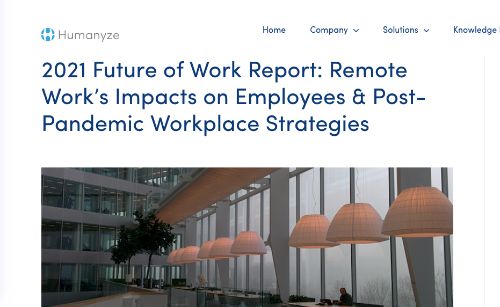
In our recent 2021 Future of Work report and survey, we begin by posing an intriguing question: “Did you know that 50% of employees aren’t fully confident that their company’s post-pandemic strategy will be well thought out?” This very statistic serves as the driving force for this report, one that explores the impacts of remote work on employees as well as their sentiments around a potential return to the office.
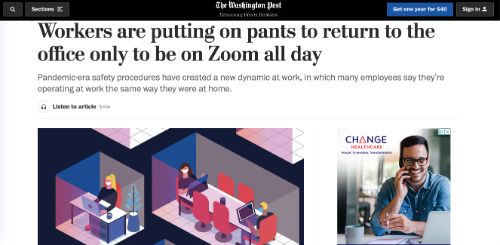
The Washington Post takes a deep dive into the conundrums today’s workers are facing and explores how in-person work has yet to return for many. Author Danielle Abrill reports that, with the unexpected rise of the Delta variant, many “in-person” workplaces are turning to “in-person Zoom,” where employees video chat with one another while in the same office, but behind closed doors.
3. The future of work after COVID-19 (McKinsey)

Written and conducted by McKinsey Global Institute, this eye-opening case study is comprised of stats that center around the idea of worker proximity and how their work was affected during the height of the pandemic. McKinsey also points to research suggesting that remote workplaces are here to stay – but not without a number of factors and considerations to weigh.
4. Returning to work in the future of work (Deloitte)
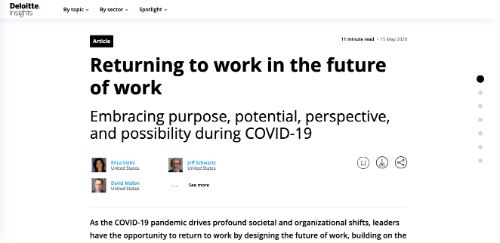
In its blog Deloitte Insights, leaders from Deloitte take a hopeful approach to pandemic and post-pandemic workplaces – places that they say should “embrace purpose, potential perspective, and possibility.” The piece implores employers to leverage the time spent away from the office and the innovative solutions implemented to navigate the crisis, taking it as an opportunity to create a healthier and more productive workplace.
5. Future Of Work Post Covid-19 (Forbes)
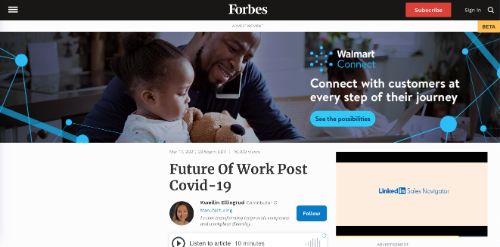
Did you know that 17 million workers may need to change their occupations by 2030? In this article, Kweilin Ellingrud discusses how industries are likely to adopt automation more quickly than predicted due to social distancing and equity impacts. She further details why these equity impacts could mean even more bad news for people of color, those already most affected by the pandemic.
6. The 8 Ways That COVID-19 Will Transform Businesses, Jobs and Our Working Lives (USC)
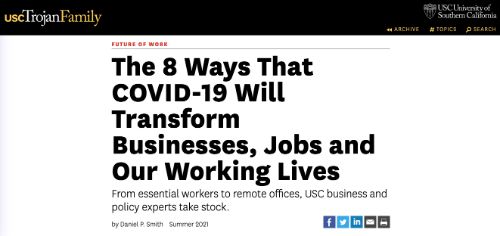
Featuring interviews from USC business and policy experts, this article reports the findings of the pandemic’s most provocative studies. These experts often analyze stats through sociological lenses, including the ways that the pandemic has affected women in the workplace and how HR can introduce work-from-home perks to stimulate retention and talent discovery.
7. 9 Future of Work Trends Post-COVID-19 (Gartner)

In its survey of 800+ HR leaders, Gartner Human Resources discusses how nine powerful HR trends have emerged from the pandemic – and why companies should take note. While many of these are positive, such as “designing for resiliency instead of efficiency,” the article does note a “dehumanization of employees,” as well as “increases in organizational complexity.”
8. The pandemic changed the way we work. 15 CEOs weigh in on what’s next (CNN)
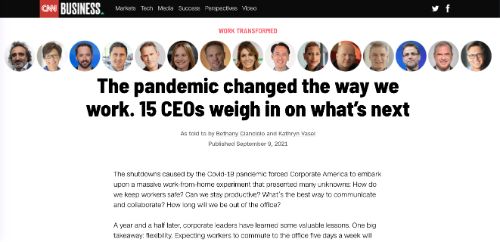
CNN rounded up 15 CEOs from a range of businesses to get their sincere views on the post-pandemic workplace culture shifts impacting today’s leaders. While some focus on the conceptualizing of “the future of work,” most agree that the work-from-home model that helped so many companies survive during the pandemic is one that will – and should – remain.
9. What matters most? Five priorities for CEOs in the next normal (McKinsey)
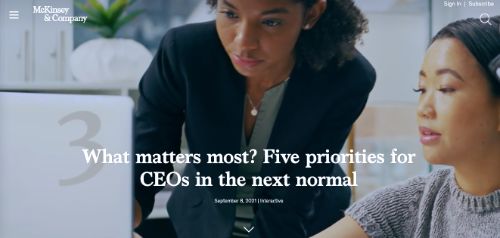
Expanding on its landmark pandemic case study, McKinsey explores how today’s leaders can adapt to an unarguably uncertain future. From centering strategies on sustainability to cultivating existing talent, this report is filled with helpful tips backed by powerful research that are sure to inspire CEOs everywhere.
10. COVID-19 and the future of business (IBM)

Crisis and change are the subjects of this report from the Strategy and Management leaders at IBM. In it, executives highlight five of the most important business opportunities that can help organizations respond to factors surrounding both crisis and change. With tips like, “The human element is the key to success,” IBM takes a holistic approach to workplace management.
11. Winning the ’20s in an Accelerated Post-COVID World (BCG)

Boston Consulting Group presents a compelling agenda for business success in the post-COVID-19 economy. This article takes a look at long-term strategic priorities that should be at the forefront of leadership agendas in the coming months. The authors talk a lot about competitive advantage and how to balance efficiency with resilience.
12. COVID Killed the Traditional Workplace. What Should Companies Do Now? (Harvard Business School)
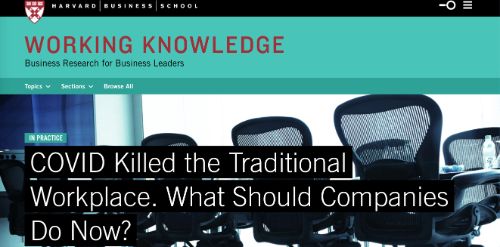
It’s clear from the headline of this Harvard Business School article that workplace cultures are changing. This roundup post features insights from several members of HBS faculty, each giving their unique take on these changing dynamics. There are many great tips, such as, “Hybrid remote arrangements should be designed to bring teams physically together during periods of temporary colocation,” suggested by Raj Choudhury, a Lumry Family Associate Professor who studies the effects of geography on worker productivity.
13. Physical Office Spaces Will Still Serve A Purpose After The Pandemic (Forbes)
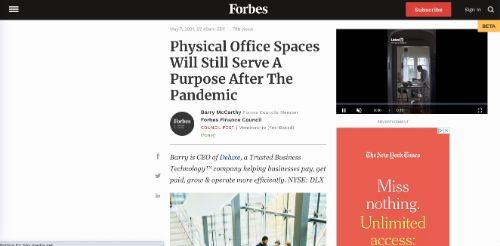
Forbes Councils member Barry McCarthy discusses the importance of physical office space in this interesting take on the developing COVID-19 workplace. While acknowledging that hybrid work models are likely to be the most popular choice for most companies, he also shares statistics that highlight the importance of balancing remote and physical work locations. The overall theme here is productivity, as well as finding the best way to motivate and empower your employees.
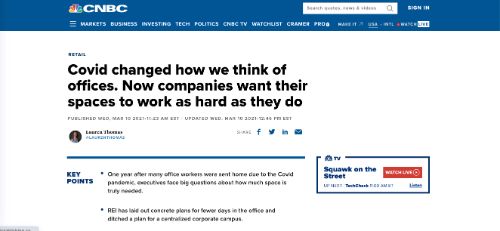
This recent news article from CNBC shares the story of outdoor equipment giant REI and its decision to forego the construction of a centralized corporate campus. Instead, the company is opening smaller satellite offices in different parts of the country that will still allow employees to gather but also cater to remote work arrangements. Additional examples are given from other leading retailers such as Ralph Lauren and CVS Health.
15. Do You Really Need All that Office Space? (Harvard Business Review)

Companies that have adopted remote work arrangements are trying to figure out what to do with their existing office space. Nikodem Szumilo and Thomas Wiegelmann from Harvard Business Review challenge readers to consider if they even need this space at all. They suggest several factors to consider when deciding the fate of your office space, including employee needs and the existing office design.
16. Flexibility is Key in the Future of Work (SmithGroup)
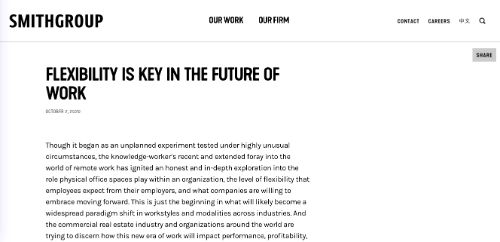
SmithGroup has compiled some interesting COVID-19 workplace statistics from employees around the world. The majority of respondents desire flexible workspace policies that take their individual needs into account. This article not only shares some great insights but also highlights the importance of soliciting feedback directly from employees.
17. How Will Covid-19 Change Demand For Office Space? (WSP)
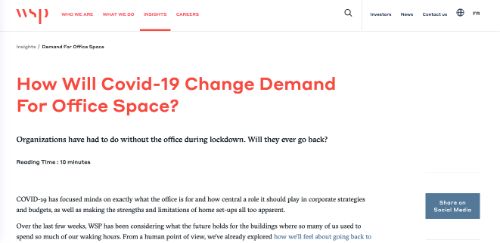
This detailed article from WSP explores how the demand for office space may shift in the coming years. Many businesses are realizing that teams can still perform at a high level when working remotely. Despite these shifts, the physical office does maintain a very important role as a location for important meetings, trainings, and gatherings.
18. The future of office space can create financial opportunities (Deloitte)
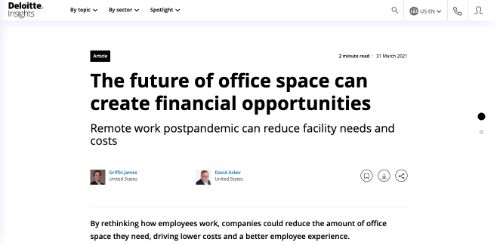
This article from the Deloitte Insights blog is an excellent reminder of the financial benefits that reducing office space can provide. The authors review several scenarios that a company must choose from when setting a new path forward. You will also find some helpful estimates of potential office space cost reductions that have been gathered for various industries.

We’ve all learned some important lessons in these past two years as the COVID-19 pandemic has changed our ideas about work and life. This article from McKinsey and Company shares four best practices that resilient organizations have used to evolve during the pandemic. There is also a focus on decision-making and how these business leaders continue to develop and focus on clear priorities for their organizations.
20. The hybrid office, post-COVID-19: making work safe for people and ideas (IBM)
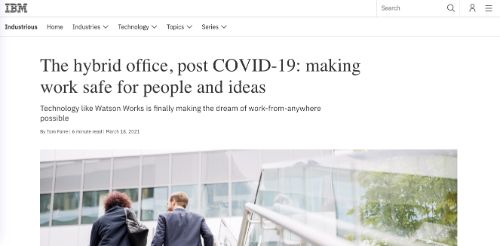
In this article, IBM discusses the hybrid office environment and how employers can ensure a smooth transition for employees. After describing how a standard vision for the hybrid office is developing, the piece then focuses on the importance of technology. New offerings, such as IBM’s own Watson Works, are poised to enable new ways of collaboration for businesses of all sizes.
21. Lessons Learned About Remote Work, One Year In After The Great Dispersal (Forbes)
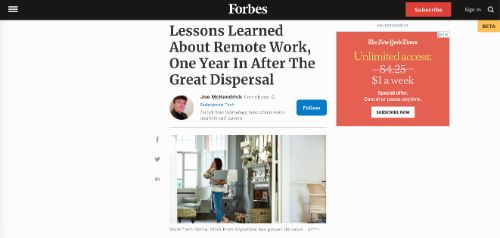
Joe McKendrick, a regular Forbes contributor, shares important lessons learned in the year since the arrival of COVID-19. It has been a time of technological and process transformation. Insights from several industry leaders are quoted in the article. You’ll find several common themes, such as flexibility, resilience, and technology mentioned throughout the piece.
22. Lessons from Asia: How to handle the return to work so well that employees don’t quit (Reuters)
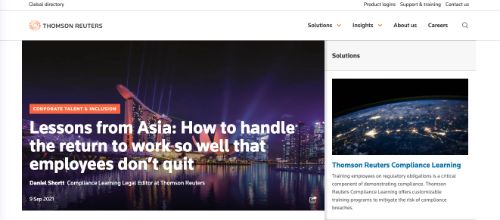
Taking a unique view of the COVID-19 pandemic from the perspective of Asia-based businesses, this article demonstrates the power of working with employees to find workplace solutions. Many Asian companies are known for their focus on employee well-being and have found innovative ways to engage with staff during the pandemic. Near the end of the article, you’ll see several tips for increasing retention during this particularly challenging time.
23. Fortune 500 Executives Tell Us What Their Post-COVID Workplaces Will Look Like (Great Place To Work)
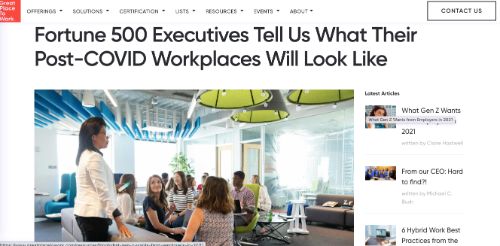
Great Place to Work has compiled survey data from 79 Fortune 500 executives and created this interesting summary of how the post-COVID-19 workplace will evolve. This article has some excellent charts that highlight the dramatic shifts toward remote work and the current challenges that companies face. Executives also share their expectations for the benefits they’re expecting as they return to the workplace.
24. The Future Of Offices And Workspaces, Post-Pandemic (Forbes)
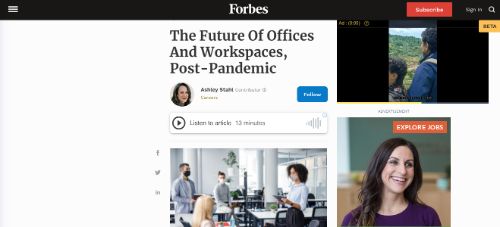
This Forbes article, written by Ashley Stahl, asks several questions at the outset, such as, “Will office culture ever go back to the way it was before Covid-19?” There are some dramatic changes possible for the large tech campus that many are used to seeing at companies like Google and Facebook. She also explains the challenges faced by co-working space providers as everyone tries to find their place in the post-pandemic economy.
25. 7 Office Trends For Post COVID-19 (Strong Project)
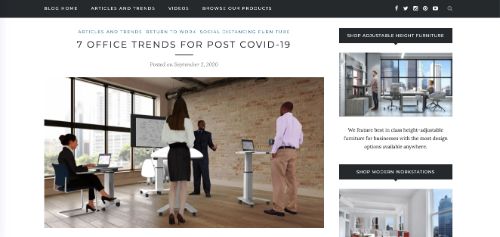
Offices will certainly continue to play a role in defining work culture, and this article presents seven noticeable trends. Not only will social interactions become more intentional behavior, but employers will also need to rethink how they design office layouts to accommodate new preferences in the workplace. This is a lengthy article that paints a vivid picture of the opportunity that post-pandemic office spaces will provide.
